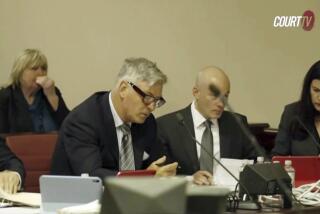Jury Selection Starts in 2nd Peyer Trial
- Share via
Attorneys in the retrial of accused murderer Craig Peyer began the tedious but crucial process of jury selection Monday, screening a pool of prospective jurors from which they will select 12 to decide the fate of the former California Highway Patrol officer.
More than 260 prospective jurors were quizzed by Superior Court Judge Richard Huffman about their ability to hear the widely publicized case. By day’s end, Huffman had excused 50 jurors, mostly because of the financial hardship they would face by serving during what undoubtedly will be a lengthy trial.
The remaining jurors will return to the courtroom in small groups during the coming weeks and face a battery of questions from attorneys, who will attempt to ferret out those with biases rendering them unable to be impartial.
Vital to Both Sides
Although rather dull for observers, the task of seating a jury is vital to both sides because of the effect that a single juror’s opinion can have on the outcome of a trial. Huffman predicted that it will take a month to select 12 jurors and four alternates for Peyer’s second trial because of the extensive media attention the case has received. The trial itself is expected to last two months.
Peyer, 37, is charged with murder in the Dec. 27, 1986, death of Cara Knott, a 20-year-old San Diego State University student. Knott’s strangled body was found below an abandoned highway bridge near the Mercy Road off-ramp on Interstate 15.
Prosecutors allege that Peyer, while in uniform and on routine patrol along the freeway, pulled Knott’s Volkswagen over on the darkened Mercy Road off-ramp, strangled the young woman and tossed her body into a dry creek bed 65 feet below the bridge.
Peyer’s first trial ended Feb. 25 when a jury deadlocked, 7-5 for conviction. In interviews after Huffman declared a mistrial, some jurors said they had doubts about the credibility of two key prosecution witnesses. They also complained that the San Diego County district attorney’s office had failed to provide a convincing motive for the slaying.
A 13-year-veteran of the CHP, Peyer has been free on bail since March, 1987. He appeared in court in a dark suit Monday, flanked by his attorneys, Robert Grimes and Diane Campbell, and with his wife, Karen, and other family members looking on.
Also in the courtroom were Knott’s parents, Samuel and Joyce Knott, and assorted other relatives, many of whom were present during the first trial.
Questions the prospective jurors faced Monday were limited to what effect serving in such a time-consuming trial would have on their jobs and personal lives. But, beginning today, each will be peppered with often-personal queries designed to determine whether he or she can be objective in judging Peyer’s guilt or innocence.
Because of the heavy publicity that Peyer’s first trial attracted, nearly all of the jurors probably have some knowledge of it. Indeed, when Huffman asked about 150 of the jurors Monday whether any had not heard of the case, not one raised a hand.
Still, attorneys for both sides appeared confident that they can select an unbiased panel from the pool assembled.
“We expect nearly everyone will have heard about the case. The question is . . . whether they can be fair,” said Deputy Dist. Atty. Paul Pfingst, the lead prosecutor in the retrial. “The law says jurors are entitled to know about a case. The key is: Can they approach a case with an open mind? . . . I think we’ll find some who can.”
Defense attorney Grimes signaled his confidence about finding a dozen objective jurors last week when he withdrew a motion to move the trial out of San Diego County. Before the first trial, Grimes attempted to relocate the trial because of the publicity. Huffman rejected the request, however, ruling that, although press attention had been significant, it had not made selecting an unbiased jury impossible.
In other matters Monday, Grimes sought court clarification of an order requiring prosecutors to inform the defense about their “consultation” with expert witnesses. Grimes said he was concerned that Pfingst has “a narrower view” of the order’s requirement than he does and hinted that prosecutors might not be fully complying with the directive.
Later in the day, Huffman met briefly in private with Pfingst to determine whether the prosecutor had failed to share with the defense attorneys any information that was legitimately due them. Pfingst said after the conversation that the judge had not ordered him to turn over any more materials or names to Grimes.
By a tentative timetable agreed to by the judge and attorneys Monday, opening arguments in the retrial will commence May 16.
More to Read
Sign up for Essential California
The most important California stories and recommendations in your inbox every morning.
You may occasionally receive promotional content from the Los Angeles Times.










